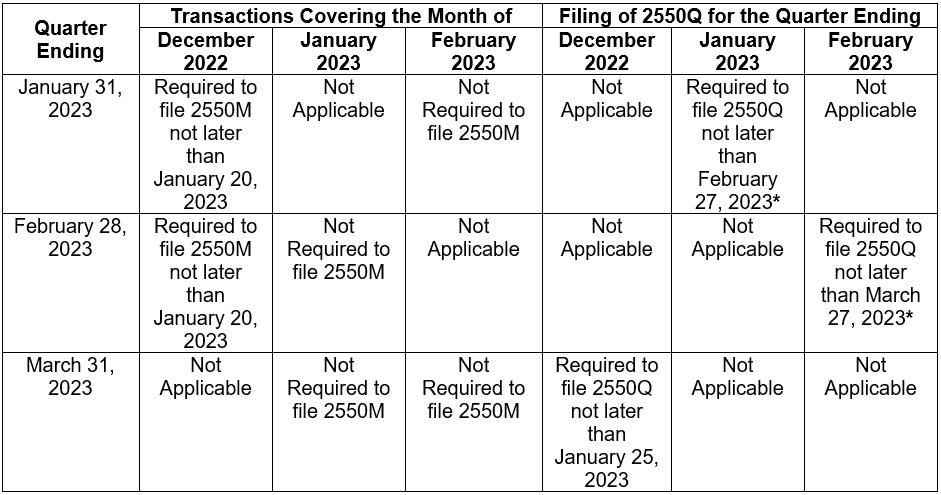-
Audit approach overview
Our audit approach will allow our client's accounting personnel to make the maximum contribution to the audit effort without compromising their ongoing responsibilities
-
Annual and short period audit
At P&A Grant Thornton, we provide annual and short period financial statement audit services that go beyond the normal expectations of our clients. We believe strongly that our best work comes from combining outstanding technical expertise, knowledge and ability with exceptional client-focused service.
-
Review engagement
A review involves limited investigation with a narrower scope than an audit, and is undertaken for the purpose of providing limited assurance that the management’s representations are in accordance with identified financial reporting standards. Our professionals recognize that in order to conduct a quality financial statement review, it is important to look beyond the accounting entries to the underlying activities and operations that give rise to them.
-
Other Related Services
We make it a point to keep our clients abreast of the developments and updates relating to the growing complexities in the accounting world. We offer seminars and trainings on audit- and tax-related matters, such as updates on Accounting Standards, new pronouncements and Bureau of Internal Revenue (BIR) issuances, as well as other developments that affect our clients’ businesses.
-
Tax advisory
With our knowledge of tax laws and audit procedures, we help safeguard the substantive and procedural rights of taxpayers and prevent unwarranted assessments.
-
Tax compliance
We aim to minimize the impact of taxation, enabling you to maximize your potential savings and to expand your business.
-
Corporate services
For clients that want to do business in the Philippines, we assist in determining the appropriate and tax-efficient operating business or investment vehicle and structure to address the objectives of the investor, as well as related incorporation issues.
-
Tax education and advocacy
Our advocacy work focuses on clarifying the interpretation of laws and regulations, suggesting measures to increasingly ease tax compliance, and protecting taxpayer’s rights.
-
Business risk services
Our business risk services cover a wide range of solutions that assist you in identifying, addressing and monitoring risks in your business. Such solutions include external quality assessments of your Internal Audit activities' conformance with standards as well as evaluating its readiness for such an external assessment.
-
Business consulting services
Our business consulting services are aimed at addressing concerns in your operations, processes and systems. Using our extensive knowledge of various industries, we can take a close look at your business processes as we create solutions that can help you mitigate risks to meet your objectives, promote efficiency, and beef up controls.
-
Transaction services
Transaction advisory includes all of our services specifically directed at assisting in investment, mergers and acquisitions, and financing transactions between and among businesses, lenders and governments. Such services include, among others, due diligence reviews, project feasibility studies, financial modelling, model audits and valuation.
-
Forensic advisory
Our forensic advisory services include assessing your vulnerability to fraud and identifying fraud risk factors, and recommending practical solutions to eliminate the gaps. We also provide investigative services to detect and quantify fraud and corruption and to trace assets and data that may have been lost in a fraud event.
-
Cyber advisory
Our focus is to help you identify and manage the cyber risks you might be facing within your organization. Our team can provide detailed, actionable insight that incorporates industry best practices and standards to strengthen your cybersecurity position and help you make informed decisions.
-
ProActive Hotline
Providing support in preventing and detecting fraud by creating a safe and secure whistleblowing system to promote integrity and honesty in the organisation.
-
Accounting services
At P&A Grant Thornton, we handle accounting services for several companies from a wide range of industries. Our approach is highly flexible. You may opt to outsource all your accounting functions, or pass on to us choice activities.
-
Staff augmentation services
We offer Staff Augmentation services where our staff, under the direction and supervision of the company’s officers, perform accounting and accounting-related work.
-
Payroll Processing
Payroll processing services are provided by P&A Grant Thornton Outsourcing Inc. More and more companies are beginning to realize the benefits of outsourcing their noncore activities, and the first to be outsourced is usually the payroll function. Payroll is easy to carve out from the rest of the business since it is usually independent of the other activities or functions within the Accounting Department.
-
Our values
Grant Thornton prides itself on being a values-driven organisation and we have more than 38,500 people in over 130 countries who are passionately committed to these values.
-
Global culture
Our people tell us that our global culture is one of the biggest attractions of a career with Grant Thornton.
-
Learning & development
At Grant Thornton we believe learning and development opportunities allow you to perform at your best every day. And when you are at your best, we are the best at serving our clients
-
Global talent mobility
One of the biggest attractions of a career with Grant Thornton is the opportunity to work on cross-border projects all over the world.
-
Diversity
Diversity helps us meet the demands of a changing world. We value the fact that our people come from all walks of life and that this diversity of experience and perspective makes our organisation stronger as a result.
-
In the community
Many Grant Thornton member firms provide a range of inspirational and generous services to the communities they serve.
-
Behind the Numbers: People of P&A Grant Thornton
Discover the inspiring stories of the individuals who make up our vibrant community. From seasoned veterans to fresh faces, the Purple Tribe is a diverse team united by a shared passion.
-
Fresh Graduates
Fresh Graduates
-
Students
Whether you are starting your career as a graduate or school leaver, P&A Grant Thornton can give you a flying start. We are ambitious. Take the fact that we’re the world’s fastest-growing global accountancy organisation. For our people, that means access to a global organisation and the chance to collaborate with more than 40,000 colleagues around the world. And potentially work in different countries and experience other cultures.
-
Experienced hires
P&A Grant Thornton offers something you can't find anywhere else. This is the opportunity to develop your ideas and thinking while having your efforts recognised from day one. We value the skills and knowledge you bring to Grant Thornton as an experienced professional and look forward to supporting you as you grow you career with our organisation.
Republic Act (RA) No. 10963 or the TRAIN Law introduced several major revisions to the National Internal Revenue Code (Tax Code) of 1997. While the law became effective 01 January 2018, some changes were made effective through staggered implementation.
One of the notable changes that will be implemented this year is the removal of the monthly filing of Value-Added Tax (VAT) returns. Section 37 of the TRAIN Law, amending provisions of Section 114(A) of the Tax Code of 1997, as amended, and as implemented under Section 4-114-1(A) of Revenue Regulations (RR) No. 13-2018, states that “beginning January 1, 2023, the filing and payment required under this subsection shall be done within twenty-five (25) days following the close of each taxable quarter”. Thus, VAT-registered taxpayers are no longer required to file the Monthly VAT Declaration (BIR Form No. 2550M) for transactions starting January 1, 2023. Instead, they will file the corresponding Quarterly VAT Return (BIR Form No. 2550Q) within twenty-five (25) days following the close of each taxable quarter.
TRANSITORY PROVISION FOR THE YEAR 2023
VAT-registered taxpayers felt a sense of relief when the year 2022 ended, given that they no longer need to file and pay their VAT payable monthly. However, there was a confusion during the initial implementation of the said provision, particularly for taxpayers that are under a fiscal period of accounting. To clarify the rules, the BIR issued Revenue Memorandum Circular (RMC) No. 5-2023 providing transitory rules for the implementation of the quarterly filing of VAT returns.

Note: *The 25th day deadline falls on a Saturday
The RMC provides that for taxpayers with quarter ending January 31, 2023, they are still required to file BIR Form No. 2550M for the month ending December 31, 2022 and BIR Form No. 2550Q for the quarter ending January 31, 2023.
For taxpayers with quarter ending February 28, 2023, they are still required to file BIR Form No. 2550M for the month ending December 31, 2022 and BIR Form No. 2550Q for the quarter ending February 28, 2023.
For taxpayers with quarter ending March 31, 2023, they are required to file BIR Form No. 2550Q for the quarters ending December 31, 2022 and March 31, 2023.
With the revised rules, beginning April 2023, all taxpayers who are required to file VAT return shall file the BIR Form No. 2550Q on a quarterly basis.
WHAT TO EXPECT FROM THE BIR
Taxation, in simple terms, “is the act of levying a tax to apportion the cost of government among those who, in some measure, are privileged to enjoy its benefits and must therefore bear its burden”. The three phases of the power of taxation are levying, assessment, and collection. Given that the BIR is the national agency in charge of collecting internal revenue taxes, the collection of funds to implement the government’s projects and objectives is their top priority. Different methods have been enforced to collect taxes and to reach their monthly, quarterly, and annual budget.
When the Tax Code removed the requirement for monthly filing and payment of Expanded Withholding Tax and Final Withholding Tax in 2018, the BIR still mandated the withholding agents to file a remittance form on a month basis for the first two months of the quarter. The BIR reasoned that taxes withheld by the withholding agents are held in trust for the government and its availability is an imperious necessity to ensure sufficient cash inflow to the National Treasury.
Although this may not be the same case with VAT, by the end of 2022, some taxpayers were anxiously awaiting news if the BIR will also require the filing of a monthly remittance return for VAT. Fortunately, RMC 5-2023 was issued on 13 January 2023, allaying the apprehensions of taxpayers and clarifying the rules.
REVISION OF THE BIR FORM NO. 2550Q
After the transitory provision under the RMC 5-2023, taxpayers who are required to file the VAT returns will no longer need to use BIR Form No. 2550M. Moreover, the current version of BIR Form No. 2550Q may be revised in the near future, removing item no. 26A - Monthly VAT Payments - previous two months in line with the provision under Section 37 of the TRAIN Law.
MOVING FORWARD
The removal of the monthly filing and paying of VAT favorably affects taxpayers in two ways. First, it impacts taxpayers’ cash flow as they will be able to hold on to their cash for the first two months of each quarter. This will allow them to use the funds in the meantime and hopefully, reduce short term borrowing. Second, it simplifies their VAT compliance requirements. This move of the government further strengthens ease of doing business in the Philippines and allows taxpayers to devote more time to their core businesses.
Despite the favorable provision of removing the monthly filing ang payment of VAT return, the taxpayers should not be complacent when it comes to the preparation of the quarterly VAT returns. It is still recommended to prepare the schedules and computation monthly to avoid spending too much time processing and filing three months’ worth of transactions all at once.
Taxpayers should also keenly follow the discussions related to the Ease of Paying Taxes bill which is now pending in the Senate. The bill proposes new rules aimed at further simplifying VAT rules and making paying taxes less burdensome for taxpayers.
Let's Talk Tax is a weekly newspaper column of P&A Grant Thornton that aims to keep the public informed of various developments in taxation. This article is not intended to be a substitute for competent professional advice.
As published in BusinessWorld, dated 07 February 2023




